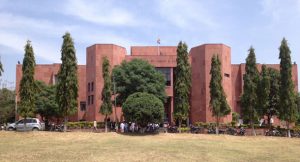
JKUT (Jammu), November-29-2022-( JNF):- Justice Rahul Bharti of Jammu & Kashmir and Ladakh High Court quashed FIR 23/2022 registered with police station Majalata in rape case with the observations that the power of investigation without knowing the province of investigation is the bane of police investigation proving to be failure in bringing home successful prosecution of criminal cases in the courts of law. The present case presents the exact scenario rendering the very FIR and the so called investigation there under exposed to serious challenge.
According to the police case that an FIR no. 0023/2022 dated 17.03.2022 came to be registered by the complainant-respondent 2 herein, by personally visiting the Police Station Majalta, district Udhampur for registering the complaint against the petitioner. On this police register a case.
Justice Rahul Bharti after hearing Sr. Adv Abhinav Sharma with Adv Abhimanyu Sharma for the applicant observed that 19. Feeling concerned by the state of facts and circumstances, a perception cannot avoid to gather a sort of confirmation that while the Police Investigation acts with relish to exhibit its harassment bearing power of investigation aiming more to quick fix the facts into its view point of accusation but faintly knows the province of investigation out of which the full facts are to be drawn out to prove the script of the crime in all its details. While the power of investigation is given by the Code of Criminal Procedure, 1973, the province of investigation is provided by the Indian Evidence Act, 1872. Section 3 of the Indian Evidence Act, 1872 provides when a “Fact” is to be held Proved/Disproved and Not proved before a Court of law. It is by this principle of proof that a court of law enables itself to make verdict in a case/cause, be it a civil or criminal cause getting trial before it. It is through the field of facts as envisaged under the Indian Evidence Act, 1872 that the police investigation has to charter itself to identify the true facts of accusation. The very definition of “Fact in Issue” & “Relevant Fact as given in the very opening of section 3 of the Indian Evidence Act, 1872 are encyclopaedic of what is to come out before a court of law either in a civil case or criminal case before it in which a court of law has to make an adjudication. It is with respect to this definition of “Fact” that definition of expressions “Proved, Disproved and Not Proved” come into play through judgment making of a court of law dealing with trial of case/cause. The Police Investigation has to be led and driven by the domain concepts of “Facts in Issue” and “Relevant Facts.” If a given Police Investigation has least bothered to follow the script of said two domains, then in the name of Police Investigation what is taking place would be nothing but paper collection and compilation venture by the Investigation Officer so as to claim the service credit of having prepared and submitted a police report/challan in a court of law unmindful of its soundness and sustainability in a court of law.
Court further observed that in the name of the investigation in the present case, only an empty formality has been carried out by the Investigation Officer/s leaving the truth of the case a casualty. In fact, the very FIR on the face of it pointed towards a fact that its latent objective was to force the petitioner to part with the marriage related documents and photographs for enabling the respondent 2 to act as per the dictate of her parents. Thus FIR and its so called investigation are act of abuse of process of law aimed against the petitioner and others named therein and as such both deserve to be quashed and are accordingly so quashed. JNF